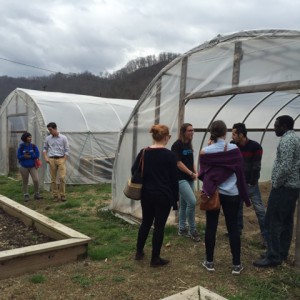
Fulbright Amizade participants visiting a community garden in Williamson, WV, built on a mountain top after strip mining. Photo by Khaliungoo Ganbat
When I was informed of my selection to participate in the Fulbright Amizade service-learning program in Williamson, West Virginia, I was very excited to share the news with my friends in the United States. To my surprise, their reaction to what I thought was great news was rather negative. They said that West Virginia is like a U.S. version of the developing world, and told me to get ready to see a completely different face of America than what I had seen since I began my Fulbright grant. Having worked with people from rural areas in Mongolia, who struggled to find drinking water, and Aboriginal Australians, whose livelihoods are almost completely dependent on mining, I wasn’t sure what to expect from West Virginia.
On our second day, we drove to Williamson and enjoyed the beautiful scenery all throughout the trip. When we arrived, it was nothing like my friends had described. It was small, yet well-organized and unbelievably clean. We were welcomed by the former Mayor Darrin McCormick, who showed us around and spoke about how Williamson is rebuilding its economy after their coal production had plummeted. It seemed to me that Williamson is headed in a positive direction and has great potential to diversify its economy.
West Virginia is almost entirely mountainous, and as I was flying in, I saw several strip mining sites, or what they call “mountaintop removal mining.” It broke my heart to think about the impact strip mining has had on locals and the environment. To my surprise, West Virginia decided to keep these flatter lands and utilize them for agriculture and industrial livestock production, as well as for building a new airport, school, and even a golf course to attract tourists. Moreover, Williamson’s citizens have turned an old mining butcher shop into an amazing sports and recreational center, and other abandoned buildings into an indoor, year-round farmer’s market and restaurants.

A high school football field in Mingo County, WV, also built on a mountaintop after strip mining. Photo by Khaliungoo Ganbat
One of the dangers of a “stereotype” or fixed perception is that it can easily and slowly destroy a community. I truly believe that it is time for America to break away from the pervasive stereotypes it holds about Appalachia and help rebuild the region’s economies. The process will take a lot of time, money and hard work.
It is my third day in Williamson and I am still looking for a clear answer to my question about how it ended up where it is now. How did mining go so wrong in West Virginia? Was it caused by the decline of the coal industry in the region? Was it the unsustainability of the company town model? Or, was it the government’s fault?
My country, Mongolia, is blessed with natural resources, and yet, we are not doing a very good job of adequately managing our mining revenue so that the socio-economic development and livelihood of local communities can be sustained even after a mine closes. When I was speaking to Piper Anne Wind Campbell, the then-U.S. Ambassador to Mongolia, before leaving Mongolia to pursue my Fulbright grant, she asked me why I made a decision to go back to school. I told her that there had to be a better way that I could support the realization of a long-term, sustainable future for these communities and I wanted to find it. Fulbright Amizade’s service-learning program has been a great experience for me thus far, and it has allowed me to explore more about the multiple causes and impacts of a town’s dependency on mining and possible preventative measures. I am excited for Williamson and cannot wait to come back and see its progress in few years.
Follow the Fulbright Amizade service-learning enrichment activity below to see where the group is now. You can also follow along on Twitter and Instagram at #FulbrightAmizade.

1 Comment
I grew up in the area. I was born at Williamson Memorial Hospital during a labor strike at the Appalachian Regional Hospital due to nursing wages and other issues. The area has been ripe with economic issues since the citizens were lowballed on mineral rights to the land a handful of decades ago. Not unlike Mongolia, there are issues with clean drinking water, and there are many people living outside of their means. That being said, we are also a resilient people. We are proud of what we have accomplished and our youth are prospering despite the disadvantages that may come with the title of being from Central Appalachia.